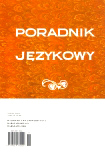Opozycje semantyczne w klasie liczebników niewłaściwych (homonimicznych z formami rzeczowników)
Semantic Oppositions in the Class of Indefinite Numerals (Homonymous with Forms of Nouns)
Author(s): Magdalena ŻabowskaSubject(s): Language and Literature Studies
Published by: Dom Wydawniczy ELIPSA
Keywords: semantyka; liczebniki niewłaściwe; liczebniki właściwe;
Summary/Abstract: In this article I describe semantic features of ten Polish expressions: masa, moc, kupa, fura, odrobina, ociupina, kapka, garstka, garść and szereg. Semantic structures of these numerals include three components. The first one denotes the fact that the quantity of something can be specified only in an approximate way. The next component shows that the quantity of something is large or small. And the third one refers to the speaker's intention. According to these components, three groups of analyzed numerals can be distinguished. Lexemes masa, moc, kupa and fura, which describe a large quantity of something, belong to the first group. There are expressions odrobina, ociupina, kapka and garstka, which mean a small quantity of something, in the second group. The third group includes numerals which do not describe how much or how little of something there is. Expressions garść and szereg belong to it.
Journal: Poradnik Językowy
- Issue Year: 2005
- Issue No: 02
- Page Range: 27-37
- Page Count: 11
- Language: Polish
- Content File-PDF

